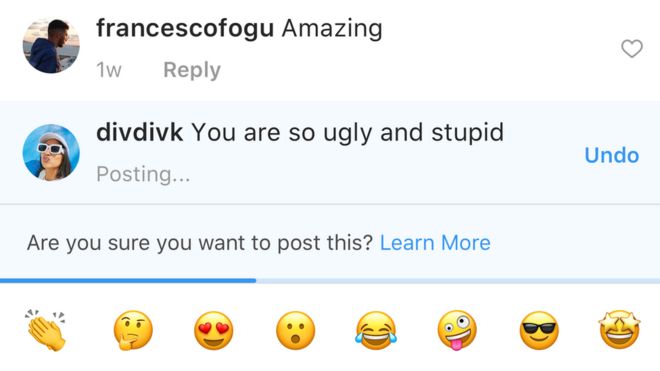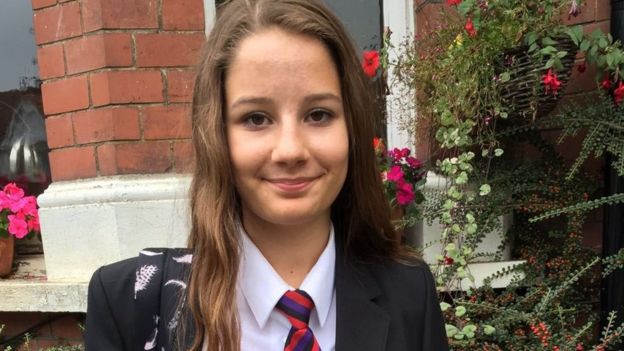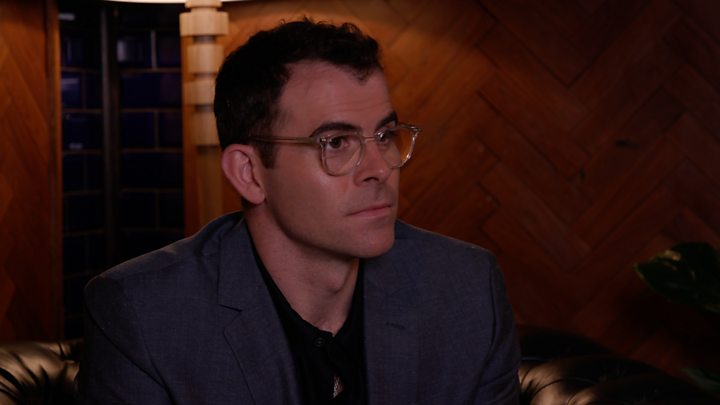Instagram now asks bullies: 'Are you sure?'
Article from: BBC
Author: Dave Lee

It will also soon offer the targets of bullying the ability to restrict interactions with users who are causing them distress.
Instagram has been under pressure to deal with its bullying problem after high profile cases, including the suicide of British teenager Molly Russell.
In a blog post, the firm’s chief executive Adam Mosseri said his firm “could do more” on the issue.
"We can do more to prevent bullying from happening on Instagram, and we can do more to empower the targets of bullying to stand up for themselves,” Mr Mosseri wrote.
"These tools are grounded in a deep understanding of how people bully each other and how they respond to bullying on Instagram, but they’re only two steps on a longer path.”
‘Rethink’
Instagram said it was using artificial intelligence to recognise when text resembles the kind of posts that are most often reported as inappropriate by users.
In one example, a person types “you are so ugly and stupid”, only to be interrupted with a notice saying: “Are you sure you want to post this? Learn more”.
If the user taps “learn more”, a notice informs: “We are asking people to rethink comments that seem similar to others that have been reported.”

The user can ignore the message and post anyway, but Instagram said in early tests that "we have found that it encourages some people to undo their comment and share something less hurtful once they have had a chance to reflect.”
The tool is being rolled out to English-speaking users at first, with plans to eventually make it available globally, Instagram told the BBC.
Restricted
The company said it will soon roll out an additional tool, called Restrict, designed to help teens filter abusive comments without resorting to blocking others - a blunt move that could have repercussions in the real world.
"We’ve heard from young people in our community that they’re reluctant to block, unfollow, or report their bully because it could escalate the situation, especially if they interact with their bully in real life,” Mr Mosseri said.
"Some of these actions also make it difficult for a target to keep track of their bully’s behaviour.”

Image copyrightPA
Once a user has been restricted, their comments will appear only to themselves. Crucially, a restricted person will not know they have been restricted.
"You can choose to make a restricted person’s comments visible to others by approving their comments,” Mr Mosseri explained.
"Restricted people won’t be able to see when you’re active on Instagram or when you’ve read their direct messages.”
‘No excuse’
Bullying on social media, particularly Instagram, was brought into tragic focus earlier this year.
The father of 14-year-old Molly Russell, who took her own life, said distressing content about depression and suicide on Instagram were partly responsible for his daughter's death.
In April, the British government published its Online Harms white paper, a policy proposal that sought tighter controls on technology firms. It suggests the creation of an independent regulator to direct ways in which firms should deal with all manner of abuse, including bullying.
The paper was met with a mixed response, with some questioning its efficacy, and fears it could be overreaching.

At Facebook’s recent developer conference, Mr Mosseri said a key focus of Instagram - which Facebook owns - is to tackle the bullying issue.
“It’s really encouraging to see that the new feature has been rolled out,” said Alex Holmes, deputy chief executive of the Anti-Bullying at the Diana Award, and a long-time anti-bullying advocate.
The group has received some funding from Facebook for real-world anti-bullying initiatives in schools. Mr Holmes told the BBC he felt social media firms could still do more to actively teach users about decent behaviour.
"If you are under 18, you should have to go through awareness building when you sign up,” he said.
"I think it would be a pretty simple thing, for the first five minutes, to go through. Platforms should be able to make the issue of safety more appealing, more engaging."


